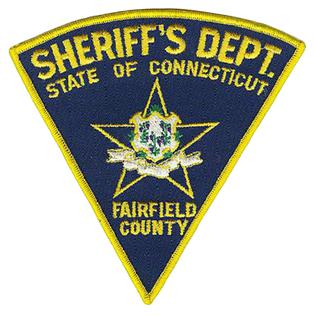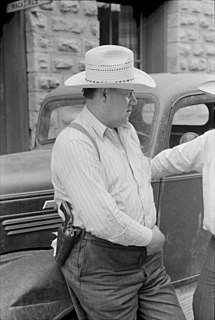
New Haven County is a county in the south central part of the U.S. state of Connecticut. As of the 2020 census, the population was 864,835, making it the third-most populous county in Connecticut. Two of the state's largest cities, New Haven (3rd) and Waterbury (5th), are part of New Haven County.
A sheriff is a government official, with varying duties, existing in some countries with historical ties to England where the office originated. There is an analogous, although independently developed, office in Iceland that is commonly translated to English as sheriff, and this is discussed below.

The United States Marshals Service (USMS) is a federal law enforcement agency in the United States. The USMS is a bureau within the U.S. Department of Justice, operating under the direction of the Attorney General, but serves as the enforcement arm of the United States federal courts to ensure the effective operation of the judiciary and integrity of the Constitution. It is the oldest U.S. federal law enforcement agency, created by the Judiciary Act of 1789 during the presidency of George Washington as the "Office of the United States Marshal". The USMS as it stands today was established in 1969 to provide guidance and assistance to U.S. Marshals throughout the federal judicial districts.

A bailiff is a manager, overseer or custodian; a legal officer to whom some degree of authority or jurisdiction is given. Bailiffs are of various kinds and their offices and duties vary greatly.

A justice of the peace (JP) is a judicial officer of a lower or puisne court, elected or appointed by means of a commission to keep the peace. In past centuries the term commissioner of the peace was often used with the same meaning. Depending on the jurisdiction, such justices dispense summary justice or merely deal with local administrative applications in common law jurisdictions. Justices of the peace are appointed or elected from the citizens of the jurisdiction in which they serve, and are usually not required to have any formal legal education in order to qualify for the office. Some jurisdictions have varying forms of training for JPs.
Marshal is a term used in several official titles in various branches of society. As marshals became trusted members of the courts of Medieval Europe, the title grew in reputation. During the last few centuries, it has been used for elevated offices, such as in military rank and civilian law enforcement.

The office of Pennsylvania State Constable is held as a municipally elected, sworn Peace Officer throughout the state of Pennsylvania.

The government of the U.S. State of Oklahoma, established by the Oklahoma Constitution, is a republican democracy modeled after the federal government of the United States. The state government has three branches: the executive, legislative, and judicial. Through a system of separation of powers or "checks and balances," each of these branches has some authority to act on its own, some authority to regulate the other two branches, and has some of its own authority, in turn, regulated by the other branches.

The Fairfield County Sheriff's Department was a law enforcement agency in Fairfield County, Connecticut, established under the original Constitution of the State of Connecticut. Initially, the Department of Administrative Services was responsible for administering the testing process for special deputy sheriffs However, in December 2000, legislators replaced the sheriffs with the State Marshal Commission under the Department of Administrative Services. The State Marshal Commission was created by Public Act 00-99, in 2000. On November 29, 2000, a constitutional amendment repealed the portion regarding sheriffs. Presently, the 2009 version of the State of Connecticut Constitution does not make a reference to Marshals, and continues to list sheriffs as this role.
The Texas Constable is provided for in the Texas Constitution of 1876, which calls for the election of a constable in each Texas precinct of a county, and counties may have between one and eight precincts each depending on their population. The term of office for Texas constables is four years. However, when vacancies arise, the commissioner's court of the respective county has the authority to appoint a replacement to serve out the remaining term. If no person is elected and qualified under law to fill an office of constable for seven consecutive years, the respective commissioner's court may declare the office dormant and it may not be filled by election or appointment. However, the commissioner's court may reinstate the office by a majority vote or by calling an election where a majority of precinct voters approve it.

The Prince William County, Virginia Sheriff's Office was established in 1731 to provide law enforcement and jailers for the County. In 1970, the Board of County Supervisors established the Prince William County Police Department which assumed the primary responsibility for law enforcement. In 1982, the Prince William County Adult Detention Center opened and assumed the duties of jailers. The Sheriff is a constitutional office elected by the Prince William County, City of Manassas and City of Manassas Park to provide certain public safety services.

In the United States, a sheriff is an official in a county or independent city responsible for keeping the peace and enforcing the law. Unlike most officials in law enforcement in the United States, sheriffs are usually elected, although some states have laws requiring certain law enforcement qualifications of candidates. Elected sheriffs are accountable directly to the citizens of their county, the constitution of their state, and ultimately the United States Constitution.

The Baltimore County Sheriff's Office (BCoSO) is the enforcement arm of the Baltimore County, Maryland court and is headquartered in the Baltimore County Courthouse, in the County Seat of Towson, Maryland. The Baltimore County Sheriff's Office is one of the oldest sheriff's offices in existence in the State of Maryland, dating back to 1659, the traditional year of the County's "erection" (founding).
State v. Reid, 194 N.J. 386, 954 A.2d 503, was a criminal court case in which the New Jersey Supreme Court ruled that Internet service provider (ISP) subscribers have a reasonable expectation of privacy in the identifying information they provide to ISPs. This case has helped place New Jersey at the forefront of the states committed to providing their residents with broader privacy protections than those available under federal law.

The Connecticut Judicial Marshals are Court Officers in the state of Connecticut. The Judicial Marshals are sworn peace officers, with powers of arrest, but are not Connecticut POST Certified Police Officers. They perform prisoner transport and courthouse security.

The Orleans Parish Sheriff's Office (OPSO) is a coterminous law enforcement agency in New Orleans. The Orleans Parish Sheriff's Office shares legal jurisdiction with the New Orleans Police Department. The Orleans Parish Sheriff's Office is primarily responsible for corrections, serving warrants, and providing courtroom security in the City of New Orleans.
The Hartford County Sheriff's Department was a 300-person law enforcement agency that served the twenty-nine towns of Hartford County, Connecticut in North Central Connecticut. Hartford County was constituted in 1666. The Code of 1650 of the General Court of Connecticut allowed "the marshall" to collect fees for the service of executions and attachments and fines for breaches of law. In 1698, marshals became "sheriffs." In 1722, sheriffs were given the duty of conserving the peace and could command people to help them. Two years later, each sheriff became responsible for the jail in his county, with the right to appoint people as "keepers." In 1766, limits were placed on the number of deputies a high sheriff could appoint, although on special occasions other people could be used as well.
In the United States, there is no consistent use of the office of constable throughout the states; use may vary within a state. A constable may be an official responsible for service of process: such as summonses and subpoenas for people to appear in court in criminal and/or civil matters. They can also be fully empowered law enforcement officers. Constables may have additional specialized duties unique to the office. In some states, a constable may be appointed by the governor or a judge or magistrate of the court which he or she serves; in others, the constable is an elected or appointed position at the state or local level of local government. Their jurisdiction can vary from statewide to county/parish and local township boundaries based on the state's laws.

The Baldwin County Sheriff's Office, is the primary law enforcement agency for unincorporated areas of Baldwin County, Alabama, United States. As a constitutional officer the Sheriff is the chief law enforcement officer within his County. The current sheriff is Huey H. Mack. Sheriff Mack joined the Sheriff's Office in 1989 as a Criminal Investigator.














